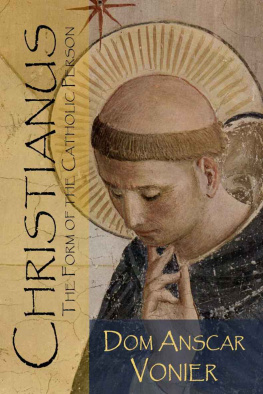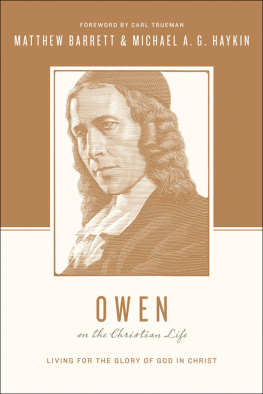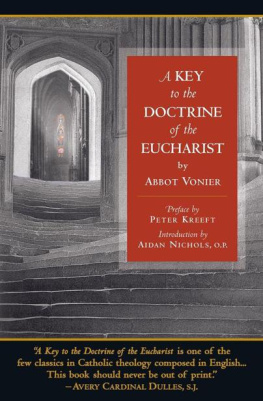The present book might be called an attempt to sketch the character of the Christian, partly from the theoretical standpoint and partly from the practical side. It is, of course, impossible to make a character study of anyone who strives seriously to live up to his baptismal vows without including the ideal the thing that ought to be. Christian life is a supernatural life, and when we study and describe the life of a saint we suppose much more than we prove. We take for granted that the saint had faith, hope and charity and the other gifts of the Spirit. On that assumption we attribute to him much that cannot be seen or proven by observation. This procedure would be wrong in merely natural psychology, but it is perfectly legitimate in supernatural psychology, where the unobserved realities are always greater than the observable ones. The series of portraits which I have tried to trace are, of course, not the complete Christian: much more might be said. But I have tried to outline at least the main features of the Catholic man, and it is my fond hope that all my readers will have no difficulty in recognizing themselves in the portrait.
Abbot. Buckfast Abbey,
Passion Sunday , 1933.
I
Christianus Discipulus
Christian Discipleship
For some people, the passage of Christ here on earth lacks the element of originality. They can find nothing in the teaching and the power of Christ which could not have been found in the life of any other person of eminent sanctity. According to such interpreters of the career of the Son of Mary He had no more influence for good, He was no nearer to men in the days of His mortality than any other leader of outstanding quality might be. Opinions of that kind can only exist in those minds which have never studied the supreme spiritual problem of the Christian discipleship. Christ gathered round Himself disciples; those disciples, in their turn, were commissioned to gather disciples not round themselves but round Christ, and so in indefinitum, indefinitely. Christianity is essentially discipleship of Christ and its deep originality lies therein:
In this is my Father glorified: that you bring forth very much fruit and become my disciples (John 15:8).
Christian fruitfulness and Christian discipleship represent God s success amongst men. In the measure in which these two qualities take hold of the children of men the glory of the Father becomes more and more radiant on this earth. Almost without an exception Jesus Christ speaks of His followers as His disciples. The Evangelists, who wrote down what they had heard and seen, almost invariably make use of the term disciple, it is only rarely that they give the name of Apostle to the Twelve. Before all things and above all things they are disciples.
Later on, in the Acts, the converts are always described as disciples, and apostolic men like Timothy are given that name though it is not applied to the Apostles themselves. St. Luke, the author of the Acts, notes the time when another title began to be bestowed on the believers in Christ:
And Barnabas went to Tarsus to seek Saul: whom, when he had found, he brought to Antioch. And they conversed there in the Church a whole year: and they taught a great multitude, so that at Antioch the disciples were first named Christians (Acts 11:25-26).
It may no doubt be said that other religious leaders and teachers of the time also called their followers disciples: there were, certainly, the disciples of John the Baptist. Thus discipleship could not mean anything very new or original in the case of Christ. To this we reply that the originality we claim is to be found in this, that One of Christ s character should admit any human being into the relation of discipleship with Himself: the quality of the Master makes the newness of the discipleship. When the Son of God says that in this is the Father glorified, that we should become His disciples, He has indeed opened out for us infinite vistas and glorious possibilities, because a disciple may be anything from a mere tyro to a consummate doctor in the special wisdom of the Master, from a new convert to the confidant of all the secrets of the Leader.
The term discipleship stands for complete initiation in all the mysteries of Christ. St. John the Divine ascribes all his exceptional privileges to the quality of this discipleship ; because he is the disciple whom Jesus loved all things may come to him:
When therefore Jesus had seen his mother and the disciple standing whom he loved, he saith to his mother: Woman, behold thy son. After that, he saith to the disciple: behold thy mother. And from that hour the disciple took her to his own (John 19:26-27).
The first element in discipleship is knowledge of the Master: knowledge of doctrine is secondary, knowledge of the person is paramount and constitutes the difference between a mere follower and a disciple. Christ expects that those who come to Him should know Him. Confidence in the Master is indeed an integral part of discipleship, but it does not primarily constitute it. The disciple is expected before all things to believe that the Master has knowledge, and in the case of Christ infinite knowledge is presupposed. The quality, then, of the disciples knowledge is the clear vision that his Lord and Master is all-knowing. On one occasion our Lord drew forth from St. Peter a most explicit statement on this issue:
After this, many of his disciples went back and walked no more with him. Then Jesus said to the twelve: Will you also go away? And Simon Peter answered him: Lord, to whom shall we go? thou hast the words of eternal life. And we have believed and have known that thou art the Christ, the Son of God (John 6 :67-70).
The disciple of all times has one great task to per form, he must enter more and more into the secrets of the Master; he must be ready for any revelation his Leader may be preparing, any manifestation of His secret greatness. So Christian discipleship means being called to witness the miracle at the marriage feast of Cana and climbing Mount Thabor; being made to share the great Pasch of the Passion and watching in the Garden of Gethsemane; being met by the Risen Christ and being led by Him to the hill-top of the Ascension; being ordered to the Upper Chamber where the Spirit is to manifest Himself and being a partaker in a thousand other things, one more marvellous than the other.
Who cannot see at a glance that Christian discipleship has no equal on earth nor rival in history? If the Christian were not a disciple he would be a very different being, spiritually, from what he is. His rank would be that of one who is a learner in a school, whereas actually he ought to be one whom Christ wants to follow Him wherever He goes, so that no portion of His life is unknown to the disciple.
This element of knowledge, this comprehen sion of the very essence of Christ profoundly differentiates the Christian from all men (I mean all good men, if such there are), who are not Christians. This peculiarity could be summed up thus: it matters little to the Christian what he is himself, what other men are, what things in general are; but it matters intensely to the Christian what Christ is, what He is thought to be, what His prerogatives are. This is true discipleship, a passionate interest in the status of the Master, so that for one iota the disciple will fight unto death, if by that iota the Masters dogmatic position is diminished, if it may imply that instead of being the equal of God He is only similar to God.




